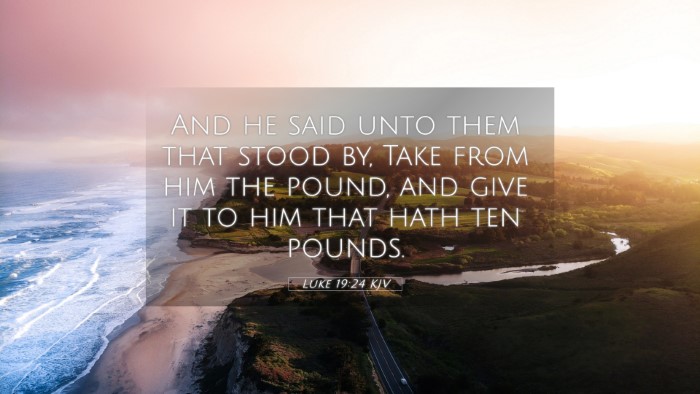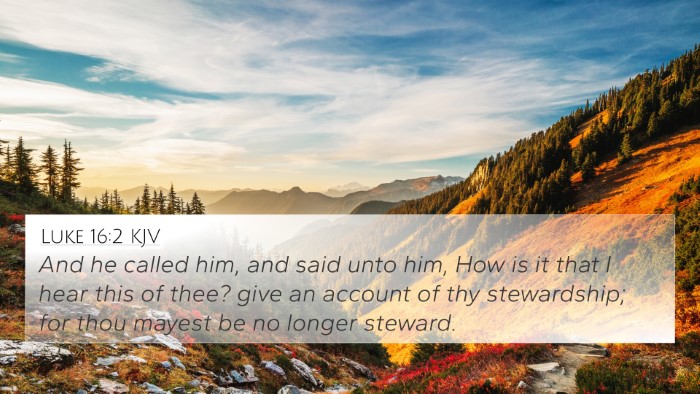Understanding Luke 19:24
Luke 19:24 states, "Then he said to those standing by, 'Take the mina away from him and give it to the one who has ten minas.'" This verse is a critical part of the Parable of the Ten Minas, which Jesus uses to illustrate the principles of stewardship, responsibility, and the consequences of our actions with the resources entrusted to us by God.
Summary of Key Themes
- Divine Accountability: The verse emphasizes that God expects us to utilize the gifts and resources He provides effectively.
- Rewards and Punishments: It illustrates the theme of reward for faithfulness and the loss faced by those who fail to invest their given resources.
- Transformation through Action: The act of taking away from the unproductive servant suggests the importance of proactively engaging with what one has been given.
Commentary Insights
The insights derived from various public domain commentaries provide a deeper understanding of this verse:
Matthew Henry
According to Matthew Henry, this verse underscores the idea that God is generous and expects His followers to be diligent in their duties. The act of giving the mina to the one who had ten signifies that those who are productive in their spiritual and material life will receive further blessings.
Albert Barnes
Albert Barnes discusses the implications of this parable, noting that it serves as a warning against laziness and neglect. Barnes suggests that every individual is given a measure of ability and resource; thus, the failure to utilize what one has leads to loss—not only material but spiritual as well.
Adam Clarke
Adam Clarke remarks that the redistribution of the mina symbolizes God's justice and fairness in governance. He points out that spiritual rewards are proportionate to one’s faithfulness; hence, those who have been faithful in small matters will be entrusted with greater responsibilities.
Bible Verse Cross-References
Luke 19:24 is interconnected with various other Bible passages, enriching its meaning through cross-references:
- Matthew 25:28-29: This parallel passage from the Parable of the Talents reinforces the Lord's expectation of faithful stewardship.
- 1 Peter 4:10: Highlights the importance of using gifts for the service of others.
- Luke 12:48: Emphasizes the principle that to whom much is given, much is required.
- Galatians 6:7: Stresses that a person will reap what they sow.
- James 2:26: Demonstrates that faith without works is dead, aligning with the theme of action.
- Hebrews 10:35-36: Encourages persevering in faith and doing good works.
- Ecclesiastes 11:6: Advises to work diligently while one has the opportunity, reinforcing the message of productivity.
Conclusions and Thematic Bible Verse Connections
The connections between Bible verses such as these illustrate a cohesive biblical narrative centered around stewardship, accountability, and divine justice. The thematic cross-referencing provides a richer landscape for viewers wishing to understand the implications of being entrusted with gifts from God.
Tools for Bible Cross-Referencing
Utilizing a Bible concordance or a Bible cross-reference guide can enhance one's study by identifying relevant passages and themes that relate to Luke 19:24. Such cross-reference Bible study tools enable individuals to engage deeply with scripture, uncovering layers of meaning and application in their lives.
Next Steps for Bible Study
For those exploring the significance of Luke 19:24 and its connections with other scriptures, consider these steps:
- Cross-referencing Bible study methods: Identify other verses that speak about stewardship and accountability.
- Engaging with commentaries: Utilize comprehensive Bible cross-reference materials to gain diverse insights.
- Applying the Lessons: Reflect on how the teachings of this parable can be implemented in daily life and interactions.
Further Exploration
To deepen your understanding, consider examining the links between the Prophets and Apostolic teachings, as well as how these themes resonate across the Old and New Testaments. This comparative analysis enriches one's grasp of the interconnectedness of the biblical narrative.




